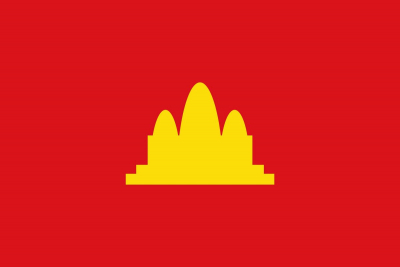Kampuchea (Khmer: , Kmpcha [kampuci]), officially known as Democratic Kampuchea (DK; Khmer: , Kmpcha Prchathbtyy [kampuci prcitipataj]) from 5 January 1976, was a one-party totalitarian state which encompassed modern-day Cambodia and existed from 1975 to 1979. It was controlled by the Khmer Rouge (KR), the name popularly given to the followers of the Communist Party of Kampuchea (CPK), and was founded when KR forces defeated the Khmer Republic of Lon Nol in 1975.
Between 1975 and 1979, the state and its ruling Khmer Rouge regime were responsible for the deaths of millions of Cambodians through forced labour and genocide. The KR lost control of most Cambodian territory to the Vietnamese occupation. From 1979 to 1982, Democratic Kampuchea survived as a rump state. In June 1982, the Khmer Rouge formed the Coalition Government of Democratic Kampuchea (CGDK) with two non-communist guerrilla factions, which retained international recognition. The state was renamed Cambodia in 1990 in the run up to the UN-sponsored 1991 Paris Peace Agreements.
The Khmer Rouge (; French: [kmɛʁ ʁuʒ]; Khmer: ខ្មែរក្រហម, Khmêr Krâhâm [kʰmae krɑːhɑːm]; "Red Khmer") is the name that was popularly given to members of the Communist Party of Kampuchea (CPK) and by extension to the regime through which the CPK ruled Cambodia between 1975 and 1979. The name was coined in the 1960s by then Prime Minister Norodom Sihanouk to describe his country's heterogeneous, communist-led dissidents, with whom he allied after his 1970 overthrow.The Khmer Rouge army was slowly built up in the jungles of eastern Cambodia during the late 1960s, supported by the North Vietnamese army, the Viet Cong, the Pathet Lao, and the Chinese Communist Party (CCP). Although it originally fought against Sihanouk, on the advice of the CCP, the Khmer Rouge changed its position and supported Sihanouk after he was overthrown in a 1970 coup by Lon Nol who established the pro-American Khmer Republic. Despite a massive American bombing campaign (Operation Freedom Deal) against them, the Khmer Rouge won the Cambodian Civil War when they captured the Cambodian capital and overthrew the Khmer Republic in 1975. Following their victory, the Khmer Rouge, who were led by Pol Pot, Nuon Chea, Ieng Sary, Son Sen, and Khieu Samphan, immediately set about forcibly evacuating the country's major cities. In 1976, they renamed the country Democratic Kampuchea.
The Khmer Rouge regime was highly autocratic, totalitarian, xenophobic, paranoid, and repressive. Many deaths resulted from the regime's social engineering policies and the "Moha Lout Plaoh", an imitation of China's Great Leap Forward which had caused the Great Chinese Famine. The Khmer Rouge's attempts at agricultural reform through collectivisation similarly led to widespread famine, while its insistence on absolute self-sufficiency even in the supply of medicine led to the death of many thousands from treatable diseases such as malaria. The Khmer Rouge regime murdered hundreds of thousands of their perceived political opponents, and its racist emphasis on national purity resulted in the genocide of Cambodian minorities. Summary executions and torture were carried out by its cadres against perceived subversive elements, or during genocidal purges of its own ranks between 1975 and 1978. Ultimately, the Cambodian genocide led to the death of 1.5 to 2 million people, around 25% of Cambodia's population.
In the 1970s, the Khmer Rouge were largely supported and funded by the Chinese Communist Party, receiving approval from Mao Zedong; it is estimated that at least 90% of the foreign aid which was provided to the Khmer Rouge came from China. The regime was removed from power in 1979 when Vietnam invaded Cambodia and quickly destroyed most of the Khmer Rouge's forces. The Khmer Rouge then fled to Thailand, whose government saw them as a buffer force against the Communist Vietnamese. The Khmer Rouge continued to fight against the Vietnamese and the government of the new People's Republic of Kampuchea until the end of the war in 1989. The Cambodian governments-in-exile (including the Khmer Rouge) held onto Cambodia's United Nations seat (with considerable international support) until 1993, when the monarchy was restored and the name of the Cambodian state was changed to the Kingdom of Cambodia. A year later, thousands of Khmer Rouge guerrillas surrendered themselves in a government amnesty.
In 1996, a new political party called the Democratic National Union Movement was formed by Ieng Sary, who was granted amnesty for his role as the deputy leader of the Khmer Rouge. The organisation was largely dissolved by the mid-1990s and finally surrendered completely in 1999. In 2014, two Khmer Rouge leaders, Nuon Chea and Khieu Samphan, were jailed for life by a United Nations-backed court which found them guilty of crimes against humanity for their roles in the Khmer Rouge's genocidal campaign.

1976Jan, 5
The Khmer Rouge proclaim the Constitution of Democratic Kampuchea.
Choose Another Date
Events on 1976
- 5Jan
Democratic Kampuchea
The Khmer Rouge proclaim the Constitution of Democratic Kampuchea. - 13Apr
Thomas Jefferson
The United States Treasury Department reintroduces the two-dollar bill as a Federal Reserve Note on Thomas Jefferson's 233rd birthday as part of the United States Bicentennial celebration. - 8May
Six Flags Magic Mountain
The rollercoaster The New Revolution, the first steel coaster with a vertical loop, opens at Six Flags Magic Mountain. - 11Oct
Gerald R. Ford
George Washington's appointment, posthumously, to the grade of General of the Armies by congressional joint resolution Public Law 94-479 is approved by President Gerald R. Ford. - 13Oct
Ebola
The first electron micrograph of an Ebola viral particle is obtained by Dr. F. A. Murphy, now at U.C. Davis, who was then working at the C.D.C.

 English
English  español
español  français
français  português
português  русский
русский  العربية
العربية  简体中文
简体中文 